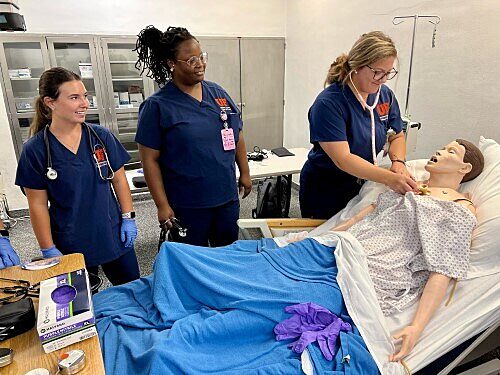State scholarship program to benefit 40 University of Florida nursing students

Accelerated Bachelor of Science in Nursing students work on a simulation mannequin during a clinical lab. File photo
New state funding will make 40 scholarships available to University of Florida students entering the UF College of Nursing’s Accelerated Bachelor of Science in Nursing program, enabling those not typically eligible for traditional scholarships to pursue a rapid-entry nursing degree.
The funding is part of the Linking Industry to Nursing Education, or LINE Fund, established in 2022 by the Florida Legislature to help alleviate the state’s nursing shortage.
The $400,000 grant requires matching funds from a health care partner. In this case, UF Health Shands and the National Cancer Institute-designated UF Health Cancer Center partnered to provide the matching $400,000 to make $800,000 available for the nursing scholarships.
“We’re grateful to the state and UF Health for these funds. We stand ready to deliver top-caliber nurses prepared to provide the compassion and care in such deficit right now,” said College of Nursing Dean Shakira Henderson, Ph.D., D.N.P., M.P.H., EMBA.
Students in the ABSN program already have bachelor’s degrees or higher in other areas of study. These students are not eligible for traditional financial assistance because funding sources like the Florida Bright Futures Program and federal Pell grants do not cover a second bachelor’s degree.
“This funding is a game changer because this money is for postbaccalaureate students. They are going into a new career. They may already have families and may already have existing education debt. It’s this specific cohort of students who most often struggle financially while at UF,” said Erik Black, Ph.D., M.P.H., the college’s associate dean for student services.
Henderson, also a second-career nurse, knows the challenges ABSN students face.
“It can be a daunting journey, but these scholarships will ease the way for those students pursuing a second career in our noble profession,” she said.
As part of the scholarship, UF Health Shands’ and UF Health Cancer Center’s portion of the funding includes a two-year work agreement. After graduation, the students agree to work as full-time registered nurses at a UF Health facility.
“Keeping UF Health-trained nurses at home, so to speak, will not only mean smoother integration but also the certainty they have received a top-notch education,” said David R. Nelson, M.D., senior vice president for health affairs at UF and president of UF Health.
The LINE Fund scholarships are offered through the latest state program aimed at reducing the shortage of nurses in Florida. In 2022, state legislators approved the Prepping Institutions, Programs, Employers and Learners through Incentives for Nursing Education, or PIPELINE.
UF received $3.6 million from that program. In addition to scholarships for Doctor of Nursing Practice and Bachelor of Science in Nursing students, the College of Nursing is hiring 20 new faculty members and buying and repairing equipment at its locations in Gainesville and Jacksonville.
In the wake of the state funding, pass rates for the National Council Licensure Examination for Registered Nurses, which nursing students must pass to become licensed, topped 98% in the most recent cycle.
The scholarships will be awarded to students in the ABSN programs in Gainesville and Jacksonville. Students in Jacksonville receive education and training at UF Health Jacksonville. College officials hope to double enrollment in the Jacksonville program to 80 students by 2025.
In Gainesville, the College of Nursing is part of the university’s academic health center, which includes six health colleges within close proximity. Students in Gainesville receive training at UF Health Shands.
All students accepted into the ABSN program are eligible for LINE Fund scholarships.
The scholarships cover tuition and books and are available to students starting this May. The Accelerated B.S.N. program takes 15 months to complete.
“PIPELINE and LINE funding have enabled the College of Nursing to distribute unprecedented support to our undergraduate and graduate nursing students. The net result is an increase in the number of trainees that we can support,” Black said.